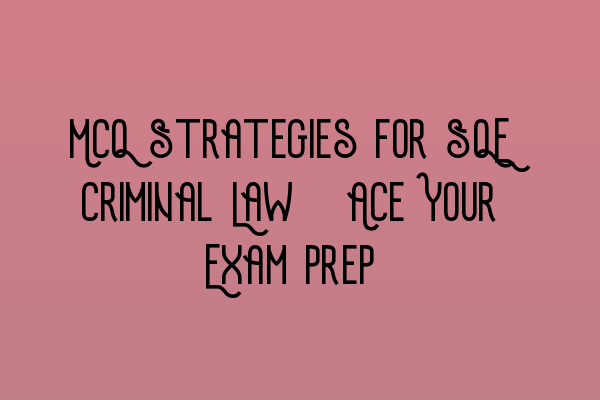MCQ Strategies for SQE Criminal Law: Ace Your Exam Prep
Preparing for the SQE Criminal Law exam can be a daunting task. The exam tests your knowledge and understanding of criminal law principles, procedures, and case law. To help you excel in your exam, we have compiled effective multiple-choice question (MCQ) strategies that will boost your confidence and enhance your performance.
1. Understand the Exam Structure
Before diving into the MCQ strategies, familiarize yourself with the exam structure. The SQE Criminal Law exam consists of multiple-choice questions designed to assess your knowledge and application of key legal concepts. Take the time to understand the exam format, time allocation, and the number of questions you need to answer.
2. Review and Master the Syllabus
To tackle MCQs effectively, you need a solid understanding of the subject matter. Review the SQE Criminal Law syllabus thoroughly, covering all the relevant topics such as criminal offenses, defenses, sentencing, evidence, and procedure. Depending on your proficiency, allocate more time to challenging areas and prioritize your study accordingly.
3. Practice Previous Exam Questions
Practice makes perfect, especially when it comes to MCQs. Familiarize yourself with the exam style and types of questions by practicing previous SQE Criminal Law exam papers. Sample questions can give you insight into the level of difficulty, question structure, and the knowledge required for each topic. Make note of recurring themes or areas where you struggle and focus on improving your understanding.
4. Analyze Answer Choices Carefully
When answering MCQs, pay close attention to the answer choices. Read each option carefully, eliminating obviously incorrect choices first. Look for keywords or phrases that may indicate the correct answer. Remember, in some cases, more than one option may seem plausible, but there is only one correct answer.
5. Utilize Process of Elimination
Utilize the process of elimination to narrow down your choices. Start by eliminating the options that you are certain are incorrect. Consider the reasoning behind each choice and eliminate those that contradict the legal principles or facts. This strategy increases your chances of selecting the correct answer, even if you are unsure about a particular question.
6. Use Context Clues
Context clues can provide valuable hints in MCQs. Pay attention to the language and phrasing of the question and answer choices. Look for clues that may help you deduce the correct answer. For example, if a question refers to a specific legal case, your knowledge of that case’s outcome can guide you in selecting the correct option.
7. Time Management
Time management is crucial in MCQ exams. Allocate your time wisely, giving more time to complex questions while ensuring you have enough time for the rest. If you are unsure about a question, mark it and come back to it later. Avoid spending too much time on a single question, as it may compromise your performance on other questions.
8. Join Workshops and Seminars
Consider joining workshops and seminars on criminal practice to expand your expertise and enhance your level of understanding. These interactive sessions provide valuable insights, practical examples, and opportunities for discussion. They can also help you clarify any doubts or misconceptions you may have.
Related article: Workshops and Seminars on Criminal Practice: Expanding Your Expertise
9. Stay Updated on UK Criminal Laws
Staying informed about the latest updates in UK criminal laws is essential for your SQE Criminal Law exam preparation. Regularly review and update your knowledge of recent legislative changes, important cases, and legal developments. This will ensure you are well-prepared for any questions related to current criminal law matters.
Related article: Updates in UK Criminal Laws: Staying Informed and Prepared
10. Enhance Your Study Group Experience
Consider joining a study group to enhance your SQE Criminal Law exam preparation. Collaborating with fellow students can help you gain different perspectives, discuss complex topics, and clarify any doubts. Share study materials, engage in group discussions, and challenge each other with relevant MCQs.
Related article: Enhancing Your SQE Criminal Law Study Group Experience
11. Understand Criminal Evidence Rules
Understanding criminal evidence rules is crucial for the SQE Criminal Law exam. Familiarize yourself with the rules of evidence, admissibility of evidence, burden of proof, and various exceptions to the general rules. Analyze case precedents that highlight the application of evidence rules in different scenarios.
Related article: Decoding Criminal Evidence Rules: A Detailed Analysis
12. Know Victims’ Rights and Legal Protections
Understanding the rights of victims and related legal protections is an important aspect of criminal law. Familiarize yourself with the legal framework surrounding victims’ rights, including their entitlements, support services, and protection in criminal procedures.
Related article: Ensuring Rights of Victims in Criminal Procedures: Legal Protections and Support
Conclusion
By utilizing the MCQ strategies outlined above, you can enhance your SQE Criminal Law exam preparation and maximize your chances of success. Remember to allocate sufficient time for review, practice previous exam questions, and stay updated on the latest developments in UK criminal laws. Join workshops, engage in study groups, and solidify your understanding of evidence rules and victims’ rights. With dedication and a strategic approach, you can ace your SQE Criminal Law exam and pave the way to a successful career in criminal practice.
